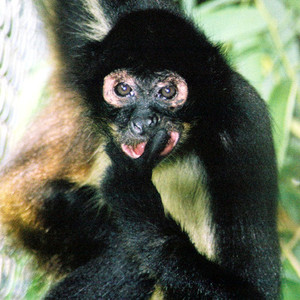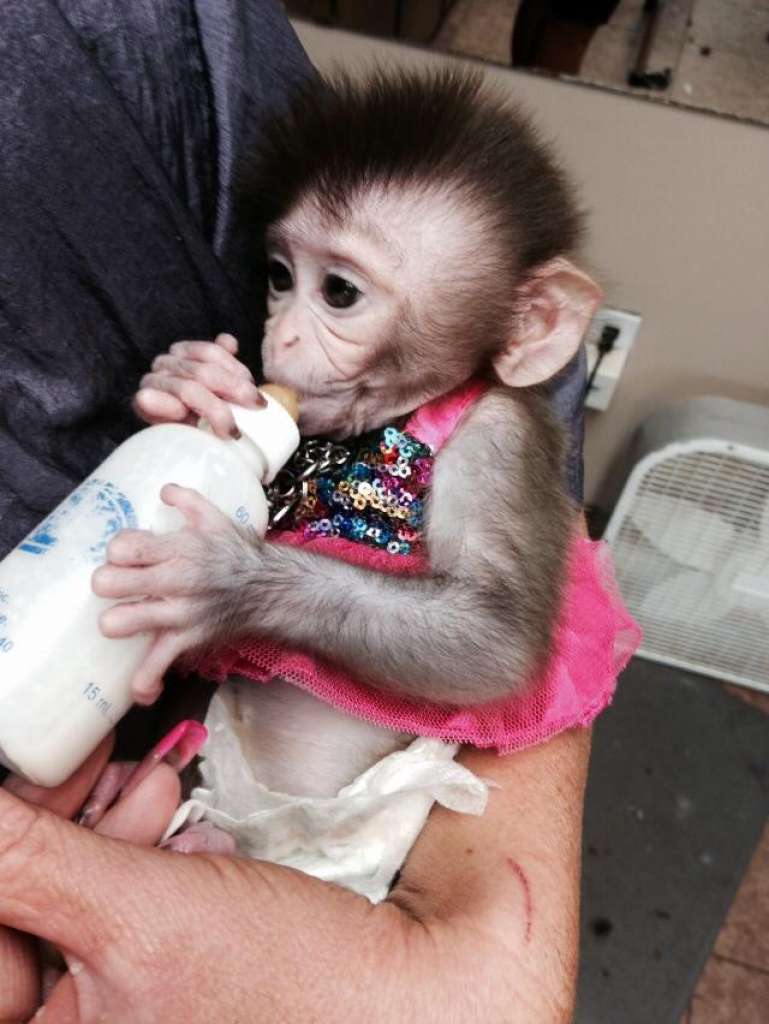Dr. Melissa Seaboch, Professor and Department Chair at Salt Lake Community College, charts the welfare of pet primates for sale in the United States
Despite their unsuitability as pets, there are thousands, if not tens of thousands, of pet primates in the United States (1), and the U.S. ranks third out of 171 countries in the ease of purchasing a pet primate online. (2) Though the pet primate trade is robust, there are few federal regulations addressing the care of companion animals or pets.
The Animal Welfare Act (AWA), often considered the minimum acceptable standard for animal care and use, governs the care of animals in multiple settings, including research labs, zoos, and commercial breeding facilities. PACT (Preventing Animal Cruelty and Torture) prevents the most egregious forms of animal cruelty, and the Lacey Act addresses interstate transportation and illegal wildlife trafficking. (3) None of these regulations address the care or welfare of pet primates.
Five freedoms of animal welfare
For guidance in the care of animals outside of labs and zoos, we can turn to the Farm Animal Welfare Council’s (FAWC) Five Freedoms (4), which are:
- Freedom from hunger and thirst, by ready access to water and a diet to maintain health and vigor.
- Freedom from discomfort by providing an appropriate environment, including shelter and a comfortable resting area.
- Freedom from pain, injury, and disease by prevention or rapid diagnosis and treatment.
- Freedom to express normal behavior by providing sufficient space, proper facilities, and appropriate company of the animal’s own kind.
- Freedom from fear and distress by ensuring conditions and treatment that avoid mental suffering.
These Freedoms form the basis of animal welfare legislation and recommendations worldwide. (5) The Five Freedoms have also been used by Soulsbury et al. to review the suitability of primates as pets and by Nekaris et al. to evaluate the welfare of pet lorises in online videos. (6,7) Soulsbury et al.’s analysis found that the welfare of pet primates, especially having an appropriate environment, social interactions, and diet, is unlikely to be met by private primate pet owners.
Nekaris et al. reported that all 100 videos they examined showed at least one negative condition, and nearly 30% of the videos showed all five negative conditions. Schuppli & Fraser based their proposed framework for assessing the suitability of species as pets and the ethical criteria for keeping animals as pets on the Five Freedoms. (7) Here, we use the Five Freedoms to evaluate the welfare of pet primates for sale in the United States.

Advertisements of pet primates for sale in the U.S.
We examined over 200 advertisements from websites selling pet primates (8) for evidence of whether these pet primates for sale experienced the Five Freedoms, and we found very few indicators of welfare in the advertisements.
Only 5.5% of the pet primates for sale were advertised as mother-raised (meeting freedom from hunger and freedom to express normal behaviors), though even those were removed from their mothers for sale well before their natural weaning age.
The majority of pet primates were infants described as bottle-fed, and natural foods (e.g., fruit) were mentioned in only four advertisements.
Freedom from discomfort (shelter and/ or a comfortable resting place) was indicated in 10% of the advertisements, though almost all photos of the pet primates for sale showed the animal indoors.
Freedom from disease was the most commonly met freedom, with about one-third of the advertisements mentioning that the pet primate was healthy, vet-checked, and/or came with a health certificate.
Freedom to express normal behavior cannot indeed be met in the captive environment. Still, there were four mentions that the pet primate was not caged/had the run of the house (sufficient space), and 12 mentions that the pet primates were being sold as a bonded pair (appropriate company of the animal’s own kind).
Freedom from fear and distress was suggested with over 10% of sellers describing the pet primate as spoiled and/or happy, though sellers are likely not equipped to recognize fear/distress in primates.
We note that, in many instances, sellers were attempting to care for the pet primates (e.g., bottle-feeding, socializing with people and other animals, providing toys and stuffed animals). Still, primates are wild, not domesticated animals, and their care in private homes cannot adequately promote their welfare.
Need for regulating private primate ownership
While this report examined advertisements of pet primates for sale for evidence of welfare as indicated by the Five Freedoms, it is important to bear in mind that it is in the sellers’ best interest to describe the pet primates as healthy and happy, and the accuracy of the descriptions in the advertisements cannot be assessed.
Additionally, the welfare of pet primates after sale is unknown, and juvenile and adult primates are more difficult to care for than infants, which were most often for sale. Six advertisements were also for owners seeking to rehome their pet primates.
In other research, many pet primate owners have admitted that they did not inform themselves about the suitability of primates as pets before deciding to get a pet primate, with some expressing regret. Animal sanctuaries are full of pet primates surrendered by their owners, and many of these pet primates are suffering from physical and behavioral problems. (9,10,11)
Thus far, the United States has been unable to ban the ownership of pet primates, and though legislation was introduced in the House, it has been sitting in committee for over three years. (12) In lieu of a ban, guidelines for the care of pet primates are needed, and the Five Freedoms, or their proposed reformulation into the Five Provisions focusing on how to promote Animal Welfare Aims, would be a sound starting point. (5)
References
- Soulsbury, C. D., Iossa, G., Kennell, S., & Harris, S. (2009). The welfare and suitability of primates kept as pets. Journal of Applied Animal Welfare Science, 12 (1), 1-20.
- Nijman, V., Morcatty, T.Q., El Bizri, H.R., Al-Razi, H., Ang, A., Ardiansyah, A., Atoussi, S., Bergin, D., Bell, S., Braga-Pereira, F., Campera, M., Das, N., Silva, F. E., Feddema, K/, Foreman, G., Fourage, A., Gnanaolivu, S. D., Hansen, M. F., Racevska, E., … Nekaris, K. A. I. (2023). Global online trade in primates for pets. Environmental Development, 48, p.100925.
- Ward, E. H. (2021). Federal statutes protecting domesticated and captive animals. Congressional Research Service.
- Farm Animal Welfare Committee. (2009). FAWC Report on farm animal welfare in Great Britain: past, present and future. https://www.ongehoord.info/wp-content/uploads/2017/12/11-1.pdf
- Mellor, D. J. (2016). Moving beyond the “five freedoms” by updating the “five provisions” and introducing aligned “animal welfare aims”. Animals, 6 (10), 59.
- Nekaris, I., Anne, K., Musing, L., Vazquez, A. G., & Donati, G. (2016). Is tickling torture? Assessing welfare towards slow lorises (Nycticebus spp.) within Web 2.0 videos. Folia Primatologica, 86 (6), 534-551.
- Schuppli, C. A., & Fraser, D. (2000). A framework for assessing the suitability of different species as companion animals. Animal Welfare, 9 (4), 359-372.
- Seaboch, M. S., & Cahoon, S. N. (2021). Pet primates for sale in the United States. PLoS One, 16(9), e0256552.
- Laufer P. (2011). Forbidden Creatures: Inside the World of Animal Smuggling and Exotic Pets. Guillford, CT: Globe Pequot Press.
- Mott M. (2003). The Perils of Keeping Monkeys as Pets. National Geographic Magazine.
- Endcap. (2012). Wild pets in the European Union. Retrieved from https://endcap.eu/wp-content/uploads/2013/02/Report-Wild-Pets-in-the-European-Union.pdf
- Blumenauer, Fitzpatrick and Blumenthal Introduce New Legislation to Ban Private Possession of Primates. 2021. [cited 12 May 2021]. Available from: https://www.blumenthal.senate.gov/newsroom/press/release/blumenthal-blumenauer-and-fitzpatrick-introduce-bipartisan-bicameral-legislation-to-ban-private-possession-of-primates

This work is licensed under Creative Commons Attribution-NonCommercial-NoDerivatives 4.0 International.


